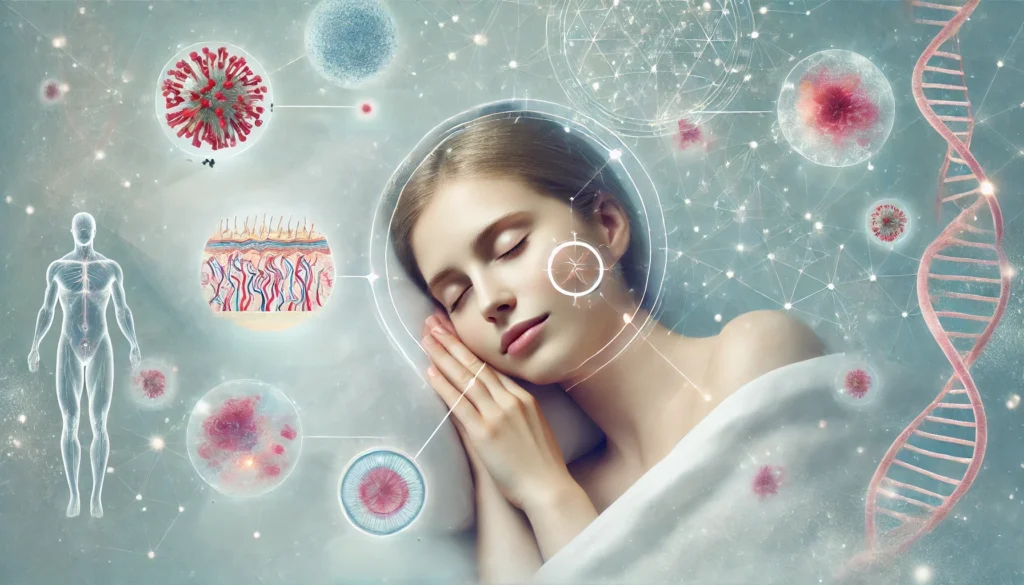Sleep is a fundamental pillar of human health, akin to nutrition and physical exercise. Yet, in our fast-paced society, sleep often takes a backseat. While the immediate effects of a poor night’s sleep might be all too familiar—grogginess, irritability, and a lack of focus—prolonged sleep deprivation can have lasting impacts, particularly on the skin. This article delves into how long-term sleep deprivation affects the skin, weaving together historical perspectives, current scientific understanding, and future implications of sleep science.
You May Also Like: Understanding the Impact of Chronic Sleep Deficiencies
Understanding the Sleep-Skin Connection
The skin, our body’s largest organ, is often the first to show signs of internal stress. Sleep plays a crucial role in skin health by facilitating the repair and rejuvenation process. During sleep, the body enters a state of repair, producing new collagen and increasing blood flow to the skin. This process helps to heal damage from UV exposure, reduce wrinkles, and maintain a healthy complexion. But what happens when this restorative phase is consistently cut short?
The Biological Mechanisms of Skin Repair During Sleep
During sleep, the body enters a restorative phase where cellular repair mechanisms are highly active. Collagen production increases, aiding in the maintenance of skin elasticity and reducing the appearance of wrinkles. Blood flow to the skin also improves, delivering essential nutrients and oxygen that facilitate healing and rejuvenation. These processes are vital for maintaining a youthful and healthy complexion.
The Impact of Sleep Cycle Disruption on Skin
The sleep cycle consists of various stages, including REM and deep sleep, each playing a unique role in skin health. Disruption of these cycles can impair the skin’s ability to repair itself, leading to premature aging and a dull complexion. Deep sleep, in particular, is crucial for the release of growth hormones that stimulate cell regeneration and repair damaged tissues.
Psychological and Environmental Stressors Affecting Sleep and Skin
Psychological stress can significantly impact sleep quality, leading to increased cortisol levels that affect skin health. Environmental factors, such as exposure to blue light from screens, can also interfere with the body’s natural sleep-wake cycle. These stressors can exacerbate skin conditions, emphasizing the need for stress management strategies to improve both sleep quality and skin health.
Historical Context of Sleep and Skin Care
Historically, the importance of sleep for skin health wasn’t as emphasized as it is today. Ancient cultures often linked sleep with overall wellness but did not specifically highlight its impact on skin. In contrast, modern dermatology and sleep medicine have identified a clear connection between adequate sleep and skin health. This shift in understanding underscores the significance of sleep in maintaining not just general health but also the aesthetic and functional health of the skin.
Ancient Beliefs and Practices Regarding Sleep
Ancient civilizations, such as the Egyptians and Greeks, recognized the importance of sleep for overall well-being. However, their understanding was more holistic, focusing on sleep as a component of a balanced lifestyle. They did not specifically link sleep to skin health, although they emphasized the need for rest in maintaining vitality.
The Evolution of Dermatology and Sleep Science
The fields of dermatology and sleep science have evolved significantly, with research increasingly focusing on the interplay between sleep and skin health. The discovery of the circadian rhythm’s impact on skin cell regeneration has been pivotal, highlighting the importance of aligning sleep patterns with natural biological cycles to optimize skin health.
Cultural Shifts in Perceptions of Beauty and Health
As societal attitudes towards beauty and health have evolved, so too has the emphasis on sleep as a critical component of skin care. The rise of the wellness movement has brought attention to the importance of sleep in achieving radiant skin, with more individuals recognizing the need to prioritize rest for aesthetic benefits.

The Visible Effects of Sleep Deprivation on Skin
Lack of Sleep Face: The Immediate Tell-Tale Signs
The term “lack of sleep face” is more than a colloquialism. Sleep deprivation can manifest visibly on the face through several signs:
1. Dark Circles and Puffiness: The blood vessels beneath the eyes become more pronounced due to lack of sleep, leading to dark circles. Fluid imbalance and poor circulation can cause puffiness.
Dark circles are often the most noticeable sign of sleep deprivation. The skin under the eyes is thin, making it more susceptible to showing changes in blood flow. Lack of sleep can cause blood to pool in this area, creating a bluish tint that results in dark circles. Additionally, insufficient rest can lead to fluid retention, causing puffiness that adds to the tired appearance.
2. Dull Complexion: Reduced blood flow to the skin during sleep deprivation results in a lackluster complexion.
A dull complexion is a common consequence of reduced sleep. When we sleep, blood flow to the skin increases, providing it with necessary nutrients and oxygen. This process slows down when sleep is compromised, leading to a lack of radiance and vitality in the skin. The accumulation of dead skin cells also contributes to this dullness, as the skin’s natural exfoliation process is disrupted.
3. Wrinkles and Fine Lines: Chronic lack of sleep accelerates the breakdown of collagen, making wrinkles and fine lines more apparent.
Sleep is crucial for collagen production, a protein that maintains skin firmness and elasticity. During sleep, the body repairs itself, stimulating collagen synthesis. However, sleep deprivation can hinder this process, accelerating the breakdown of collagen and leading to more pronounced wrinkles and fine lines. The skin’s ability to retain moisture is also affected, further contributing to the development of these signs of aging.
Long Term Sleep Deprivation Face: Chronic Impacts
Long-term sleep deprivation exacerbates these effects, leading to more persistent skin issues:
- Accelerated Aging: Consistent sleep loss is linked to decreased skin elasticity and increased signs of aging.
Over time, the cumulative effects of inadequate sleep can lead to premature aging. The skin loses its ability to bounce back, resulting in sagging and the deepening of wrinkles. The skin’s natural barrier function is compromised, reducing its ability to retain moisture and protect against environmental damage.
- Increased Sensitivity: The skin’s barrier function is compromised, making it more susceptible to environmental aggressors.
A weakened skin barrier is a significant consequence of prolonged sleep deprivation. This makes the skin more vulnerable to irritants, pollutants, and UV damage. As the barrier weakens, the skin becomes more prone to redness, irritation, and other sensitivity-related issues.
- Breakouts and Inflammation: Sleep deprivation can disrupt hormone levels, leading to increased oil production and acne.
Hormonal imbalances caused by lack of sleep can lead to increased sebum production, resulting in clogged pores and acne. Inflammation is also heightened, exacerbating existing skin conditions such as acne, rosacea, and eczema. The skin’s ability to fight off bacterial infections is impaired, further contributing to breakouts.

The Science Behind Sleep and Skin Health
Hormonal Balance and Skin
Sleep regulates hormones such as cortisol, which when elevated due to sleep deprivation, can lead to increased stress levels. High cortisol levels contribute to inflammation and exacerbate skin conditions like acne and psoriasis.
The Role of Growth Hormone
During the deep stages of sleep, growth hormone is released, which plays a crucial role in skin repair and regeneration. Insufficient sleep reduces the release of this hormone, hindering the skin’s ability to repair itself.
The Impact of Circadian Rhythms on Skin Health
Circadian rhythms, the body’s internal clock, play a crucial role in regulating skin cell functions. Disruption of these rhythms due to irregular sleep patterns can lead to impaired skin barrier function and reduced cell regeneration. Maintaining consistent sleep patterns can help synchronize circadian rhythms, promoting healthier skin.
The Influence of Melatonin on Skin Repair
Melatonin, a hormone produced during sleep, has antioxidant properties that protect the skin from oxidative stress. It helps neutralize free radicals, preventing damage to skin cells and promoting repair. Sleep deprivation reduces melatonin production, compromising the skin’s ability to defend against environmental aggressors.
The Role of Inflammatory Processes in Sleep-Deprived Skin
Chronic sleep deprivation triggers inflammatory responses in the body, affecting skin health. Increased levels of pro-inflammatory cytokines can lead to skin conditions such as acne, eczema, and psoriasis. Managing inflammation through adequate sleep is essential for maintaining clear and healthy skin.
Current Trends and Future Directions in Sleep and Skin Research
The intersection of sleep science and dermatology is a burgeoning field of research. Current trends focus on understanding the molecular mechanisms underlying sleep-induced skin repair and the potential for developing sleep-based skincare treatments. Innovations such as wearable sleep trackers and apps that promote better sleep hygiene are gaining traction, providing individuals with tools to optimize both sleep and skin health.
The Rise of Sleep-Based Skincare Products
The beauty industry is increasingly recognizing the importance of sleep in skin health, leading to the development of sleep-based skincare products. These products are designed to work with the skin’s natural repair processes during sleep, enhancing their effectiveness. Ingredients like peptides and antioxidants are often included to support skin regeneration and repair.
Advances in Sleep Technology and Their Impact on Skin
Advancements in sleep technology are revolutionizing the way we approach sleep and skin health. Wearable devices and smart home technologies can monitor sleep patterns and provide personalized recommendations for improving sleep quality. These innovations offer valuable insights into the relationship between sleep and skin, allowing individuals to make informed decisions about their skincare routines.
Future Research Directions in Sleep and Dermatology
Future research in sleep and dermatology aims to uncover the complex interactions between sleep, skin health, and aging. Scientists are exploring the potential of using sleep interventions to treat specific skin conditions, such as acne and eczema. Understanding the genetic and environmental factors influencing sleep and skin health will also be a key focus, paving the way for personalized skincare solutions.

Practical Advice for Healthier Skin Through Better Sleep
- Establish a Sleep Routine: Aim for 7-9 hours of quality sleep each night. Consistency in sleep and wake times helps regulate the body’s internal clock.
Developing a regular sleep schedule is crucial for optimizing sleep quality and skin health. Going to bed and waking up at the same time every day helps set the body’s internal clock, promoting restful sleep. This consistency allows the body to enter deep sleep stages, facilitating skin repair and regeneration.
- Create a Restful Environment: Ensure your sleeping space is conducive to rest—dark, cool, and quiet.
A comfortable sleeping environment is essential for quality sleep. Keep the bedroom dark by using blackout curtains or an eye mask to block out light. Maintain a cool temperature to promote deep sleep, and use earplugs or a white noise machine to minimize noise disturbances. A calming bedtime routine, such as reading or meditation, can also help signal to the body that it’s time to sleep.
- Mind Your Diet: Foods rich in antioxidants and omega-3 fatty acids can support skin health and improve sleep quality.
Nutrition plays a significant role in both sleep and skin health. Consuming a balanced diet rich in fruits, vegetables, and healthy fats can provide the nutrients needed for skin repair and regeneration. Foods high in antioxidants, such as berries and leafy greens, help protect the skin from oxidative stress. Omega-3 fatty acids found in fish and nuts can reduce inflammation and support healthy skin cell function.
- Limit Screen Time Before Bed: Blue light from screens can interfere with the production of melatonin, the sleep hormone.
Reducing screen time before bed is vital for promoting restful sleep. The blue light emitted by phones, tablets, and computers can disrupt the production of melatonin, the hormone responsible for regulating sleep. To minimize its impact, consider using blue light filters on devices or opting for activities that don’t involve screens, such as reading a book or practicing relaxation exercises. By prioritizing good sleep hygiene, individuals can support their skin’s natural repair processes and enhance their overall well-being.
Conclusion
The effects of long-term sleep deprivation on skin are profound, impacting not only appearance but also the skin’s functional health. As science continues to unravel the complexities of sleep and skin, it is increasingly clear that prioritizing sleep is essential for maintaining a healthy complexion. By embracing practices that promote quality sleep, individuals can support their skin’s natural repair processes and mitigate the adverse effects of sleep deprivation.
In a world that often glorifies busyness over rest, it is crucial to recognize the invaluable role of sleep in our overall health and well-being. As we continue to explore the intricate dance between sleep and skin, one thing remains certain: sleep is not a luxury, but a vital component of a healthy lifestyle. Prioritizing sleep is not just about feeling rested; it’s about giving your skin the chance to regenerate and glow, reflecting a true picture of health and vitality.
Further Reading:
How Sleep Deprivation Affects the Human Body
Among teens, sleep deprivation an epidemic
Beauty Sleep: Why Rest and Relaxation Impact Appearance
Important Note: The information contained in this article is for general informational purposes only, and should not be construed as health or medical advice, nor is it intended to diagnose, prevent, treat, or cure any disease or health condition. Before embarking on any diet, fitness regimen, or program of nutritional supplementation, it is advisable to consult your healthcare professional in order to determine its safety and probable efficacy in terms of your individual state of health.
Regarding Nutritional Supplements Or Other Non-Prescription Health Products: If any nutritional supplements or other non-prescription health products are mentioned in the foregoing article, any claims or statements made about them have not been evaluated by the U.S. Food and Drug Administration, and such nutritional supplements or other health products are not intended to diagnose, treat, cure, or prevent any disease.


